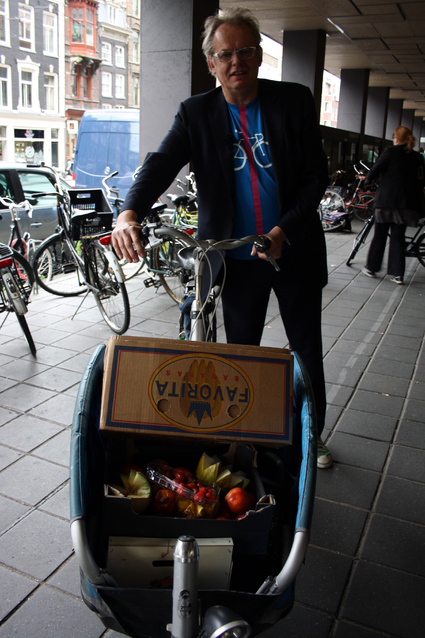Before our first Over Datum Eetclub dinner began, we went to the Albert Cuyp market to see if we could get any of the vendors to give us the left over produce that they were about to throw away at the end of a long market day. We asked the vendors at the market nicely if they would give us their left over produce. At first they were reluctant, but when we told them that we would be cooking for all our friends for free and that they were welcome to join us for dinner, they were more willing to bend the rules. Aside from the outdoor markets, food shops and grocery stores also throw away large amounts of produce and food that is about to reach its expiry date.
There is an entire garbage system at the Albert Cuyp, which is guarded since it is illegal to steal from the trash bins. The man who guards it is also involved in a kind of resistance, since he often tolerates people going through the bins who are looking for food. It appears absolutely absurd to be protecting mass amounts of food that is destined for the landfills from being taken and consumed by hungry individuals. There is an aspect of illegality in attempting to prevent food waste since rules surrounding it are on the border of the law. One of the guests at our first dinner party had gone to the Vomar market and found some packaged chopped vegetables that had just reached their expiry date, but the workers at the store would not let her buy them, and they would also not give it away to her for free. The rules that are in place around food always lead to the same place, landfills, since there is no government run composting system in place.
When I interviewed some of our dinner guests and asked them why they chose to come and whether they often buy food that is about to expire, many of them said that it is both an ideological and a thrifty choice for them. The discount is good, but they also try to not waste food at home, and by purchasing food that is about to be thrown away, they can participate in lowering the amount of waste generated by grocery stores.
In addition to personal resistance, the resistance is also a much larger one, a political one that is tied into government rules and sanctions, into a lack of education about food, and into the norms surrounding food accessibility and inaccessibility. Our first dinner garnered a large amount of press coverage because this an innovative idea, but also because it addresses an important contemporary issue. According to a study commissioned by the Food and Agriculture Organization of the United Nations, roughly one-third of the food produced in the world for human consumption every year - approximately 1.3 billion tonnes- gets lost or wasted.
There are many questions in place around food laws. Why is it illegal to take food from the trash? Why is it not socially tolerated? Why are the dumpsters around the city locked? Is food a public right? Is garbage public or private property? These questions and issues will be addressed in upcoming articles in connection with our Over Datum Eetclub dinners.
